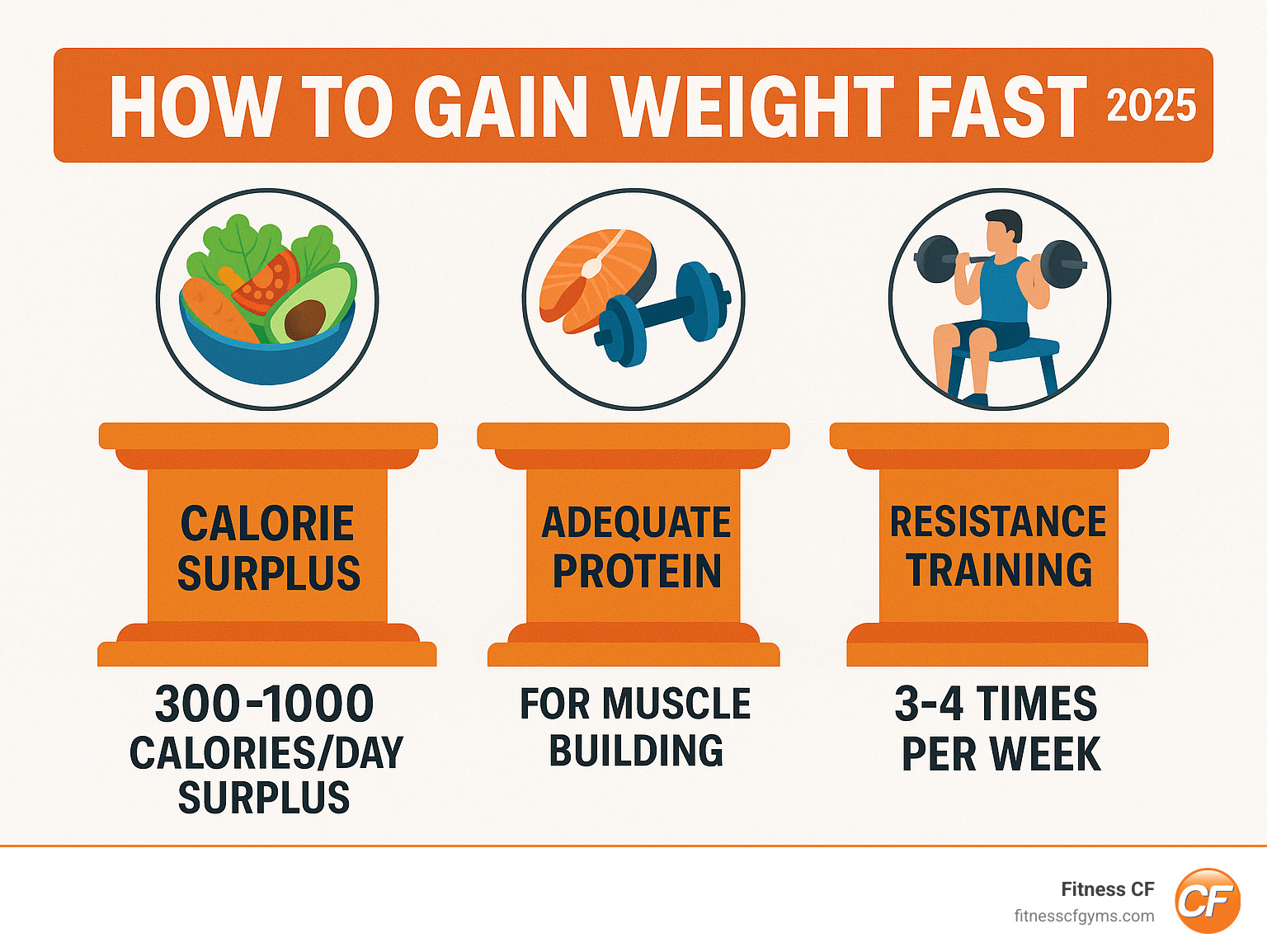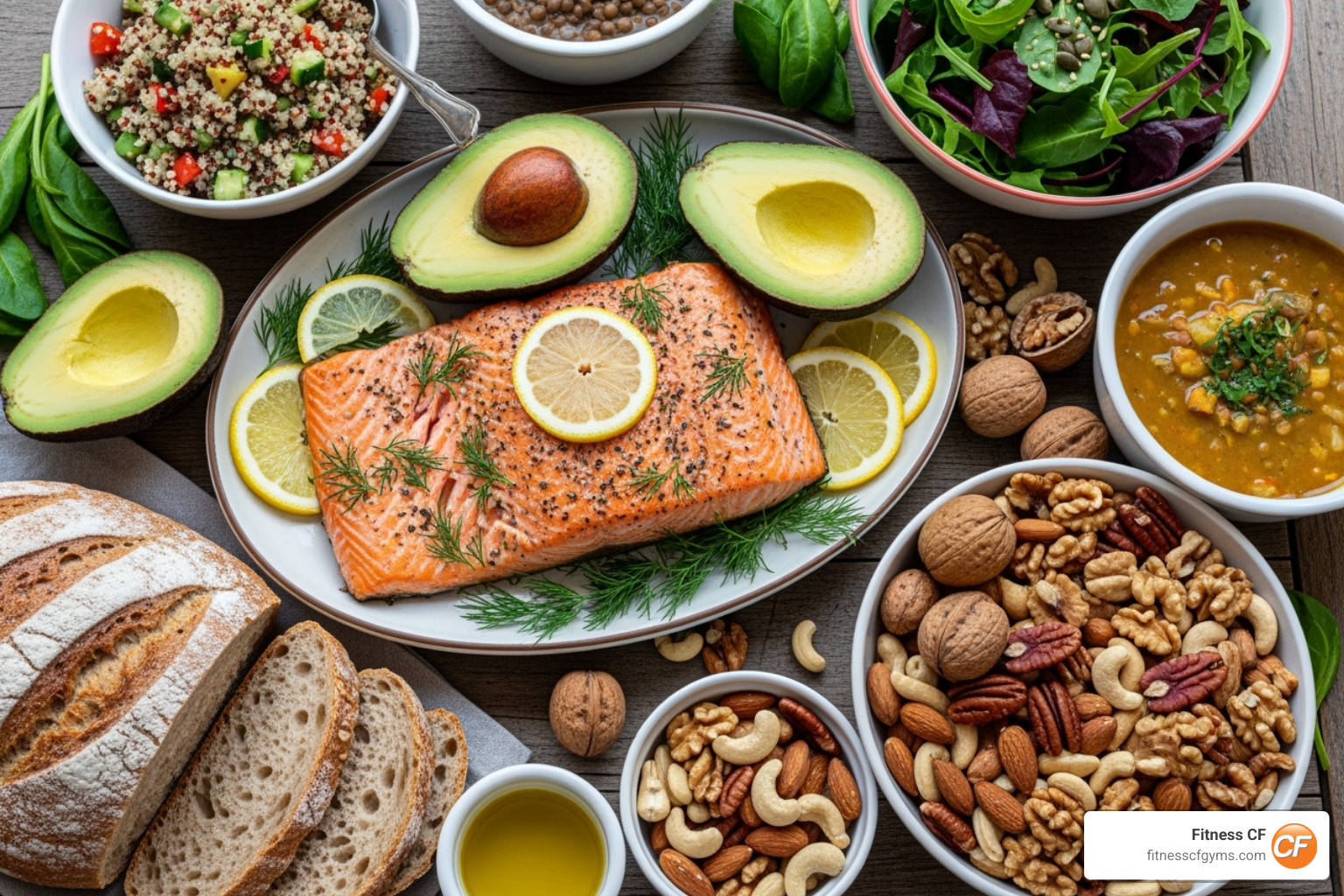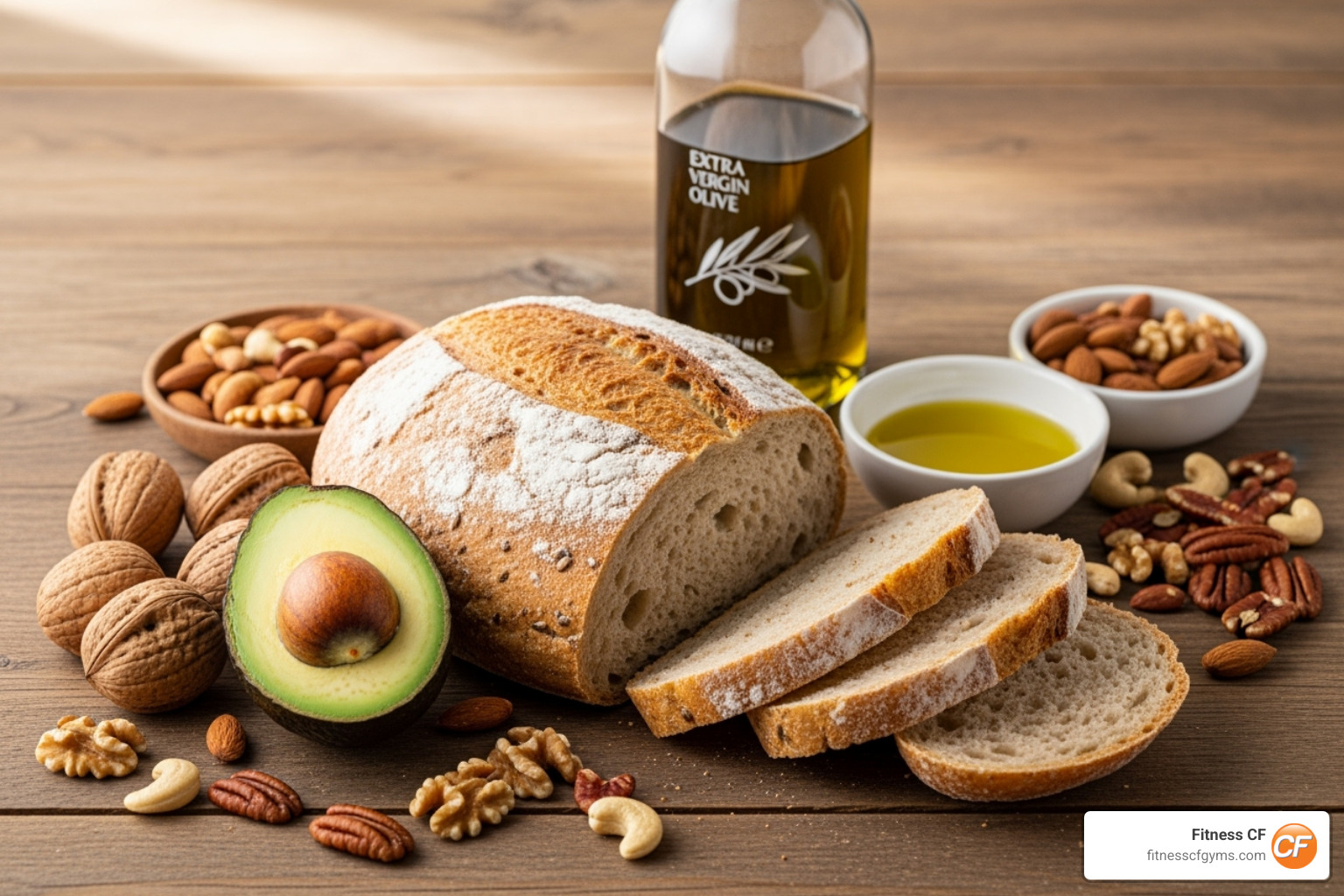Why How to Gain Weight Fast Requires a Strategic Approach
Learning how to gain weight fast isn’t as simple as just eating more. Many people struggle to gain weight, while others gain mostly fat instead of healthy muscle. A strategic approach is essential for gaining lean body mass, which requires both increased calorie intake and muscle-building exercise.
Quick Answer: The fastest healthy way to gain weight is to:
- Create a calorie surplus – eat 300-500 extra calories daily for steady gain, or 700-1,000 for faster results
- Focus on protein-rich foods – aim for high-quality sources like lean meats, eggs, and dairy
- Add strength training – build muscle mass, not just fat
- Eat frequently – 5-6 smaller meals throughout the day
- Choose nutrient-dense foods – avocados, nuts, whole grains, and healthy oils
Simply eating junk food will add pounds, but you’ll gain mostly fat, which can harm your health. The difference between gaining muscle and fat is critical. Muscle is metabolically active tissue that burns calories, while excess fat, especially around your midsection, increases health risks.
Your body needs the right combination of extra calories, quality protein, and strength training to build lean muscle. Studies show that protein supplementation during resistance training can significantly increase lean mass growth.
I’m Pleasant Lewis, and with over 40 years in the fitness industry, I’ve helped many people learn how to gain weight fast in a healthy way. My experience shows that the most successful weight gain happens when people combine smart nutrition with consistent strength training.

Easy how to gain weight fast word list:
- how to lose fat and gain muscle
- muscle building tips for fat guys
- nutrition tips for building muscle and losing fat
Understanding Your Starting Point: Are You Underweight?
Before learning how to gain weight fast, it’s important to determine if you need to. Many people who think they’re underweight are actually at a healthy weight for their body type.
Body Mass Index (BMI) is a useful starting point. A BMI under 18.5 is considered underweight. While not perfect, as it doesn’t account for muscle mass, it’s a helpful screening tool. Being 15-20% below the typical weight for your height and age may also indicate you are underweight.
Being underweight isn’t just about appearance; it can have serious health consequences.
Potential Health Risks of Being Underweight
- Weakened Immune System: Without enough fuel, your body can’t build the cells needed to fight infection, making you more susceptible to illness.
- Poor Bone Health: A lack of nutrients, especially calcium and vitamin D, can lead to fragile bones and increase the risk of osteoporosis later in life.
- Nutrient Deficiencies: Inadequate food intake can lead to deficiencies like iron-deficiency anemia, causing fatigue, weakness, hair loss, and dull skin.
- Hormonal Issues: For women, being underweight can disrupt hormonal balance, leading to irregular periods or fertility problems as the body prioritizes essential functions.
Why Might Someone Be Underweight?
While a “fast metabolism” or genetics play a role, other factors can contribute:
- Medical Conditions: An overactive thyroid (hyperthyroidism) or digestive issues like Crohn’s or celiac disease can interfere with weight gain and nutrient absorption.
- Mental Health: Conditions like anxiety or depression can suppress appetite, making eating feel like a chore. Some medications can have similar side effects.
- High Activity Levels: If you have a physically demanding job or are very active in sports, you may be burning more calories than you consume.
When to Consult a Doctor or Registered Dietitian
Talk to a healthcare professional before starting a how to gain weight fast plan, especially if you’ve lost weight suddenly without trying or if you’re concerned about the health impacts of being underweight. Unexpected weight loss could signal an underlying medical issue that needs attention.
A doctor can rule out medical causes, while a registered dietitian can create a personalized plan to help you build healthy muscle mass safely. For more guidance, you can review this resource: Underweight? See how to add pounds healthfully – Mayo Clinic.
Understanding your starting point is the first step toward gaining weight in a healthy, sustainable way.
The Core Principles of Healthy Weight Gain
To gain weight fast in a healthy way, you need a solid plan, much like building a house. It starts with a strong foundation of a calorie surplus and the right building materials, or macronutrients.
Calorie Surplus: The Foundation of Weight Gain
To gain weight, you must consume more calories than your body burns. This is called a calorie surplus. The number of calories your body needs to maintain its current weight is your calorie maintenance level.
- For steady, sustainable gains, aim for a surplus of 300 to 500 calories per day. This typically results in gaining 0.5 to 1 pound per week, primarily as lean muscle.
- For faster results, a surplus of 700-1,000 calories daily can be effective. However, a more aggressive approach increases the likelihood of gaining some fat along with muscle.
Macronutrients: The Building Blocks of Your Body
Once you know your calorie target, focus on the quality of those calories through macronutrients.
Protein is essential for building muscle. It provides the amino acids your muscles need to repair and grow after resistance training. While the FDA suggests a minimum of 50 grams daily, you’ll need significantly more to build lean mass effectively. Research shows that higher protein intake boosts muscle development.
Carbohydrates are your body’s primary fuel source. They are stored as glycogen in your muscles, providing the energy needed for workouts. With adequate carbs for fuel, your body can use protein for muscle building instead of energy. Experts recommend that 45% to 65% of your daily calories come from carbohydrates. You can find more information here: general carbohydrate recommendations from MedlinePlus.
Healthy fats are a secret weapon for adding calories efficiently, as they contain 9 calories per gram compared to 4 for protein and carbs. Fats are also crucial for producing hormones like testosterone, which supports muscle growth, and for absorbing fat-soluble vitamins (A, D, E, and K).
When these three macronutrients work together, your body is primed to build healthy muscle mass. For a deeper dive, see our guide on Nutrition Tips for Building Muscle and Losing Fat.
How to Gain Weight Fast with Nutrient-Dense Foods
When learning how to gain weight fast, the quality of your food is as important as the quantity. Focus on nutrient-dense and energy-dense foods. These pack calories, vitamins, and minerals, helping you reach your goals without feeling overly full or resorting to unhealthy junk food.

Avoid empty calories from soda and processed foods, which lead to unhealthy fat gain. We’re aiming to nourish your body to build muscle and energy.
Power Up with Protein for Muscle Growth
Protein is your best friend for healthy weight gain, providing the building blocks for muscle repair and growth.
- Red Meats: Steak, beef, and lamb are protein powerhouses rich in iron, zinc, and leucine, an amino acid that signals muscle growth.
- Salmon and Oily Fish: These offer high-quality protein and healthy omega-3 fatty acids.
- Eggs: An affordable and versatile source of protein and nutrients. Don’t skip the yolk!
- Milk and Dairy: Whole milk, Greek yogurt, and cheese provide a mix of fast- and slow-digesting proteins.
- Plant-Based Options: Beans, lentils, and chickpeas offer protein, fiber, and complex carbs.
- Poultry: Chicken and turkey are lean, versatile protein choices.
- Protein Supplements: Whey, casein, or plant-based protein powders can help you meet your goals but should complement, not replace, whole foods. For more ideas, check out our lean muscle diet.
Fuel Your Body with Complex Carbs and Healthy Fats
Carbs refill your muscle’s energy stores (glycogen), while healthy fats provide a dense source of calories.

- Whole Grains: Bread, rice, and oatmeal provide a solid carb base for meals.
- Potatoes and Starches: Quinoa, corn, and sweet potatoes are excellent for replenishing glycogen.
- Avocados: A superstar for healthy weight gain, packed with healthy fats and fiber.
- Nuts and Nut Butters: A delicious and easy way to add calories, protein, and healthy fats.
- Healthy Oils: Olive oil and other healthy oils can be added to salads, pasta, and cooked vegetables for an easy calorie boost.
- Dried Fruits: Raisins, dates, and apricots are a calorie-dense snack with natural sugars and antioxidants.
Smart Meal Strategies for Gaining Weight
Eating more doesn’t have to mean feeling stuffed. Use these strategies to increase your intake comfortably.
- Eat Frequently: Aim for 5-6 smaller meals or 3 meals with 2-3 substantial snacks. Eating every 2.5 to 3 hours keeps your body fueled.
- Use Larger Plates: This simple psychological trick can encourage you to eat slightly larger portions.
- Add Calorie-Dense Toppings: Boost meals by adding cheese to eggs, nut butter to toast, or olive oil to vegetables.
- Time Your Fluids: Drink water between meals, not right before or during, to avoid feeling full too quickly.
- Drink Your Calories: Liquid calories are less filling. Homemade protein smoothies with whole milk, fruit, nut butter, and protein powder are an excellent choice. Milkshakes and 100% fruit juices can also provide a calorie boost.
Beyond the Plate: Exercise and Lifestyle for Quality Weight Gain
Nutrition is the foundation, but how to gain weight fast and effectively requires combining calories with the right exercise and lifestyle habits. This ensures you build healthy muscle, not just fat.
Gaining muscle creates dense, firm tissue that boosts your metabolism. Gaining fat creates softer tissue that stores calories and increases health risks. Our goal is body recomposition: changing your body’s fat-to-muscle ratio for a stronger, healthier you.
| Characteristic | Gaining Muscle | Gaining Fat |
|---|---|---|
| Appearance | Denser, firmer physique; Increased definition | Softer, less defined; Increased jiggle |
| Metabolic Impact | Boosts metabolism; Burns more calories at rest | Lowers metabolism; Stores calories |
| Health Benefits | Improves strength, bone density, insulin sensitivity | Increases risk of heart disease, diabetes, inflammation |
| Composition | Lean body mass | Adipose tissue |
| Goal | Body recomposition | Usually unintended, but can be a side effect of poor habits |
How to gain weight fast by building muscle, not just fat
Strength training is the secret to directing extra calories toward muscle growth. This type of exercise stimulates muscle hypertrophy (muscle growth) by creating tiny tears in muscle fibers, which your body then repairs and rebuilds stronger.
Strength training transforms how your body uses calories, prioritizing muscle repair over fat storage. Focus on compound exercises that work multiple muscle groups, such as squats, deadlifts, bench presses, and rows. These are most effective for building overall strength and mass.
The key is progressive overload—gradually increasing the challenge by adding weight, reps, or intensity. If you’re new to training, start with bodyweight exercises like push-ups and squats. For personalized guidance, consider working with a trainer. Learn more about The Benefits of Personal Training: Tailoring Your Fitness Journey and How to Structure Lean Muscle Workouts.
Don’t forget cardiovascular exercise. It’s great for heart health, but be sure to account for the calories burned to maintain your surplus.
Lifestyle Habits That Support Your Goals
Your daily habits are crucial for healthy weight gain.
- Quality Sleep: Aim for 7-9 hours per night. During deep sleep, your body releases growth hormone, which is essential for muscle repair. Poor sleep disrupts hunger hormones, leading to junk food cravings.
- Stress Management: Chronic stress raises cortisol, a hormone that encourages fat storage and can suppress appetite. Practice meditation, yoga, or hobbies to keep stress in check.
- Quit Smoking: Smoking can suppress appetite and interfere with nutrient absorption. Quitting often leads to natural weight gain and improves cardiovascular health for better workouts.
- Strategic Hydration: Stay hydrated throughout the day, but avoid drinking large amounts of water right before or during meals, as it can fill you up.
Frequently Asked Questions about Gaining Weight
Here are answers to common questions about how to gain weight fast to help you stay on track.
What are the most common mistakes people make when trying to gain weight?
- Eating the Wrong Calories: Relying on junk food leads to unhealthy fat gain instead of muscle.
- Not Eating Enough Protein: Without adequate protein, your body cannot effectively build new muscle tissue.
- Avoiding Exercise: Strength training is essential to signal your body to use calories for muscle growth, not fat storage.
- Inconsistency: Healthy weight gain requires consistent eating and training habits.
- Giving Up Too Soon: Plateaus are normal. If your weight stalls, you may need to slightly increase your calorie intake.
- Not Tracking Progress: Monitoring your calorie intake and weekly weight helps you make necessary adjustments.
Are supplements necessary for weight gain?
No, supplements aren’t necessary, but they can be helpful. Prioritize whole foods first, as they provide a complex array of nutrients.
However, if you struggle to meet your calorie or protein goals, supplements can help:
- Protein Powders (Whey, Casein): A convenient way to boost protein intake, especially post-workout.
- Creatine Monohydrate: A well-researched supplement that increases muscle strength and size by helping your muscles produce energy during intense exercise.
- Mass Gainers: These high-calorie powders can be a last resort but are often high in sugar. A homemade smoothie is usually a better option.
Supplements should complement your diet, not replace it. For more tips, see 11 Common Muscle Building Mistakes and How to Avoid Them.
How do I maintain my weight once I reach my goal?
Maintaining your hard-earned gains requires a long-term strategy.
- Transition to Maintenance Calories: Gradually reduce your calorie surplus by 100-150 calories per week until your weight stabilizes.
- Continue Strength Training: Ongoing resistance training is crucial to maintain the muscle you’ve built.
- Stick to Healthy Habits: Continue your routine of regular meals, quality sleep, and stress management.
- Monitor Your Weight: Weigh yourself weekly to catch any unwanted changes early and adjust your intake as needed.
- Be Flexible: Your metabolism and activity levels may change over time. Be prepared to adjust your plan to maintain your results.
Conclusion
Learning how to gain weight fast and healthily is a journey of dedication and strategy. We’ve covered the essentials: confirming you’re underweight, creating a calorie surplus, choosing nutrient-dense foods, and using strength training to build lean muscle.
Healthy weight gain is a marathon, not a sprint. Sustainable results come from a gradual, thoughtful approach. Consistency is the key to lasting success. Sticking to your plan, even on days when motivation is low, is what builds momentum and delivers results.
By combining smart nutrition with strength training and supportive habits like quality sleep, you’re not just adding pounds—you’re building a stronger, healthier, and more resilient body. The long-term benefits include a boosted metabolism, stronger bones, an improved immune system, and a foundation for lifelong wellness.
Every person’s journey is unique, with ups and downs along the way. This is a normal part of the process.
At Fitness CF, we understand that fitness is personal. We are here to support you with the tools and community you need to succeed. Start your fitness journey with us today!
Your commitment to healthy weight gain is an investment in your future. Be patient, celebrate your progress, and know that you have what it takes to reach your goals.







